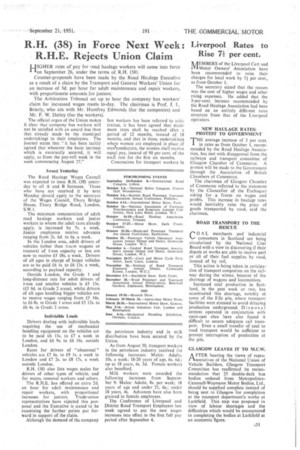Liverpool Rates to Rise 74per cent.
Page 33

If you've noticed an error in this article please click here to report it so we can fix it.
It EMBERS of the Liverpool Cart and 1V1Motor Owners' Association have been recommended to raise their charges for local work by 71 per cent., as from October 1..
The secretary stated that the reason was the cost of higher wages and other rising expenses. He added that the 3-per-cent. increase recommended by the Road Haulage Association had been based on an entirely different rates structure from that of the Liverpool operators.
NEW HAULAGE RATES: PROTEST TO GOVERNMENT
THE average increase of 3 per cent. in rates as from October 1, recommended by the Road Haulage Association, has met with disapproval from the railways' and transport committee of Glasgow Chamber of Commerce. A protest will be made to the Government through the Association of British Chambers of Commerce.
The chairman of Glasgow Chamber of Commerce referred to the statement by the Chancellor of the Exchequer asking for a freeze on wages and profits. This increase in haulage rates would inevitably raise the price of goods transported by road, said the chairman.
ROAD TRANSPORT TO THE RESCUE Com.. merchants and industrial consumers in Scotland are being circularized by the National Coal Board with a view to discovering if their depots or works are able to receive part or all of their fuel supplies by road, instead of by rail,
This action is being taken in anticipation of transport congestion on the railway during the winter, because of the shortage of wagons and locomotives.
Increased Oat production in Scotland, in the past week or two, has accentuated this shortage, notably at some of the Fife pits, where transport facilities were stressed to avoid delaying production underground. Disposal centres operated in conjunction with open-cast sites have also found it difficult to secure adequate rail transport. Even a small transfer of coal to road transport would be sufficient to prevent interruption of production at the pits.
GLASGOW LEAVES IT TO M.CW.
A FTER hearing the views of reprer "Isentatives of the National Union of Vehicle Builders, Glasgow Transport Committee has reaffirmed its recommendation that 25 double-deck bus bodies ordered from MetropolitanCammell-Weymann Motor Bodies, Ltd., should be supplied complete instead of being sent to Glasgow for completion at the transport department's works at Larkfield. This step was proposed in view of labour shortages and the difficulties which would be encountered in completing the bodies at Larkfield at an economic figure. • •




























































































